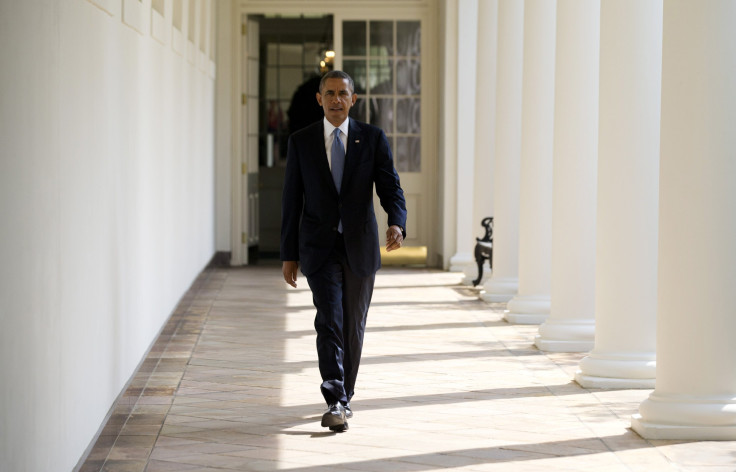Syria Developments Round-Up: Syria Agrees To Russia's Plan, Which Gets Support From More Countries; Moscow Begins Talks With Damascus

9 P.M. EDT UPDATE: President Obama is giving a speech explaining that while he is “pursuing” Russia’s proposal to remove Syria’s chemical weapons, military action must remain on the table, NBC reports. While Obama wants to keep military force an option, Prime Minister Putin has insisted that the proposal "can work only if we hear that the American side and all those who support the United States in this sense reject the use of force,” Reuters reports. "You can't really ask Syria, or any other country, to disarm unilaterally while military action against it is being contemplated,” Putin added.
At the United Nations Security Council, officials from France and Russia have argued over different drafts of the resolution demanding that Syria relinquish its chemical weapons. France insists in its proposed draft that Syria face “serious consequences,” including military action, if it does not comply. Russian officials reportedly feel differently, stating that the resolution should be non-binding at leave military action off the table.
4:05 P.M. EDT UPDATE: U.S. Secretary of State John Kerry will travel to Geneva to meet Thursday with Russian Foreign Minister Sergey Lavrov. The two will discuss the Syrian crisis, according to what a senior administration told Politico.
2:30 P.M. EDT UPDATE: Syria's Foreign Minister said President Assad's regime will declare its chemical weapons arsenal and sign the chemical weapons convention, the Associated Press reported.
11:05 A.M. EDT UPDATE: President Barack Obama has agreed to discussions at the United Nations Security Council on a proposal by Russia to secure Syria's chemical weapons stockpiles, the Associated Press reported Tuesday.
Syria Tuesday said it has agreed to turn over control of its chemical weapons, as proposed by Russia Monday, The Associated Press reported.
"We held a very fruitful round of talks with Foreign Minister Sergei Lavrov yesterday, and he proposed an initiative relating to chemical weapons,” Syria's foreign minister Walid al Moualem said, according to Interfax. "In the evening we agreed to the Russian initiative."
However, rebel forces battling the Assad government rejected the proposal as a veiled attempt by Russia to save its ally.
Russia: Russian foreign minister Sergei Lavrov on Tuesday said his country has started talks with Syria to prepare a detailed plan of action on surrendering its chemical weapons stockpile. He said that Russia and Syria are “preparing a concrete proposal which will be presented to all interested sides, including the US... a workable, specific, concrete plan."
Russia will then work with the United Nations, or UN, and the Organization for the Prohibition of Chemical Weapons, to finalize the deal, Associated Press, or AP, reported.
France: French Foreign Minister Laurent Fabius, speaking at a news conference on Tuesday, said that France will put forward a tough resolution at the UN Security Council to bring Syria's chemical weapons stocks under international control so they can be destroyed, BBC reported.
The draft resolution, which will be submitted later on Tuesday would establish “consequences” if the Syrian regime failed comply with the plan.
"We don't want to accept any delay tactics," Fabius said. "We mustn't fall into a trap."
China: Beijing hailed the Russian proposal and said it backs the efforts for a diplomatic solution to the Syrian crisis. China, along with Russia, in the past, had blocked all resolutions in the UN Security Council for punitive actions including sanctions against Assad's regime.
Israel: Israeli politicians expressed skepticism over the Russian proposal on disarming Syria of its chemical arsenal and said that the Syrian government could be “buying time.”
Iran, Other Arab Nations: Iran, a long-time ally of Assad's regime, and the Arab League Nations welcomed Russia's proposal to head-off a U.S.-led military strike on Syria.
"The Islamic Republic of Iran favors that initiative and we find this to be within putting a halt to militarism in the region," Iranian foreign ministry spokeswoman Marzieh Afkham said Tuesday, CBS News reported.
United Nations: The UN also endorsed Moscow’s proposal as a diplomatic solution to the Syrian crisis, and urged Syria to join the international anti-chemical weapons convention.
"I'm considering urging the Security Council to demand the immediate transfer of Syria's chemical weapons and chemical precursor stocks to places inside Syria where they can be safely stored and destroyed," U.N. secretary general Ban Ki-moon said, according to Reuters.
The U.S. Dilemma:
Obama was quick to welcome the Russian proposal, which many political observers said would give him a political lifeline at a time when the White House is struggling to get the required domestic and international support for its plans to strike Assad's regime.
"I want to make sure that the norm against [the] use of chemical weapons is maintained," Obama said, in an ABC News interview.
"If we can do that without a military strike that is overwhelmingly my preference," he added. However, he was skeptical about the Syrian government's commitment to the proposal. White House officials, who initially welcomed the Russian diplomatic initiative, expressed their apprehensions on the development.
"We don't want this to be another stalling tactic by the Russians, and the Syrians through the Russians," Marie Harf, spokeswoman for State Department, said according to a Wall Street Journal report.
However, the development led to confusion about the Obama administration’s efforts to get a congressional approval for its Syrian strike plans and the U.S. Senate, following the President’s comments on reconsidering the military strike, held off a debate on a resolution to authorize a strike on Syria.
Now, the possibility of a diplomatic solution is further expected to drain domestic support for a military intervention in Syria.
© Copyright IBTimes 2024. All rights reserved.






















